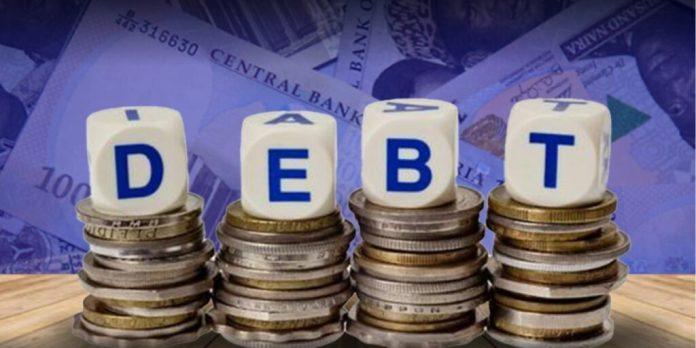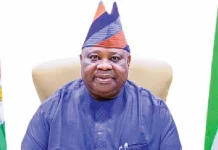Even with better foreign exchange availability and a recovery in reserves, Nigeria’s external debt servicing obligations increased dramatically in August 2025, highlighting the mounting strain on the country’s finances.
The Central Bank of Nigeria (CBN) recently released data showing that foreign debt service payments increased from $179.9 million in July to $302.3 million, a 68 percent month-over-month (m/m) increase.
In comparison to the 25 percent m/m growth recorded in the previous month, this represents one of the sharpest monthly increases in recent years, indicating increasing budgetary strain as the Federal Government continues to reconcile expanding debt commitments with minimal revenue expansion.
However, the rise was quite modest, up 8% year over year (y/y), indicating some relative stability when contrasted to 2024. However, when fresh payments from bilateral and multilateral partners age and interest payments on previously contracted loans increase, economists caution that the pattern may get worse in the months ahead.
FX Outflows Are Predominately Debt Servicing
The largest component of international payments for the month of August was external debt service payments, which made up almost 63 percent of Nigeria’s total foreign exchange outflows. This demonstrates the extent to which servicing the country’s external debt is starting to take precedence over other important foreign payments, such as import bills and external commitments of government agencies.
Nigeria paid around $2.9 billion on external debt servicing overall between January and August 2025, compared to $3.1 billion during the same time period in 2024. Although the modest year-to-date decrease suggests some relief, analysts claim that it is more a reflection of the timing of payments and reorganized commitments than of any significant decrease in debt levels.
Following new borrowings to finance infrastructure projects and close budget deficits, Nigeria’s entire public debt stock, which includes both domestic and foreign commitments, was estimated to be at N121 trillion (around $90 billion) as of mid-2025, according to CBN data. About 38% of this is external debt, and servicing commitments in foreign currencies, primarily the US dollar, consistently put pressure on fiscal stability.
Domestic Debt Remains the Mainstay
The Federal Government has continued to finance its budget deficit mostly through the domestic debt market, even in the face of a dramatic increase in payments on its external debt. Domestic instruments including FGN bonds, Sukuk, and government bills continue to be the favored funding option due to high global interest rates and cautious investor enthusiasm for emerging-market Eurobonds.
But there are hazards associated with domestic borrowing as well, such as higher returns that drive up local interest rates and restrict access to credit for the private sector. The “relative stability of the exchange rate compared with 2024 has helped ease the dollar-denominated burden,” according to analysts at United Capital Research, even if external debt services increased in August.
The severe devaluation of the naira in 2024 increased the expense of servicing dollar debts, requiring the government to allocate a greater portion of its revenue to foreign exchange liabilities. Even if nominal payments have increased this year, there has been some breathing room due to the local currency’s improved performance and the slow resumption of foreign exchange inflows.
Reserves Increase in the Face of Outflows
Contrary to expectations, Nigeria’s external reserves have increased despite the country’s mounting external debt. According to the CBN, the reserves position grew from $41.3 billion in August to $42.4 billion at the end of September 2025, a $1.1 billion monthly rise.
Reserves have increased by about $1.5 billion so far this year, indicating a consistent improvement in the nation’s external liquidity profile.
This resilience is ascribed by economists to increased foreign exchange earnings from crude oil exports, robust remittances from the diaspora, and fresh inflows of foreign money, particularly portfolio investments in the debt and equities markets after policy changes that regained investor trust.
Thanks to improved pipeline security and decreased theft, Nigeria’s average daily crude oil production has stayed over 1.6 million barrels, the highest level in two years. As the world economy improves, remittance inflows, which have historically been a major non-oil source of foreign exchange, have recovered significantly, increasing inflows by an estimated $22 billion yearly.
As a result, reserves have been gradually restored, strengthening the CBN’s ability to stabilize the naira and fulfill maturing external commitments without using up the buffer.
Softer Debt Pressure, Stronger Naira
The burden from external debt has also decreased as a result of the naira’s recent strengthening. A narrowing of the parallel-market premium has resulted from improved FX liquidity in the official window, which is the consequence of greater supply from the CBN and autonomous sources.
By the end of September, the naira was trading at about N1,150/$ on the official market, up more than 20 percent from about N1,450/$ in the middle of the year. Analysts claim that this appreciation lessens the fiscal impact and lowers the local currency value of external debt service payments.
“The ongoing appreciation of the naira, coupled with steady reserve accumulation, could limit Nigeria’s external debt exposure in the near term and improve confidence in the government’s fiscal management,” according to a report by CardinalStone Research.
The company did, however, warn that stability in oil production, a reduction in speculative demand, and the maintenance of FX supplies would be necessary for long-term progress.
Growing Debt in the Future
Financial analysts anticipate that as payments from recently approved multilateral loans start to solidify, external debt servicing will increase even more in the fourth quarter of 2025. The World Bank, African Development Bank, and Islamic Development Bank have granted Nigeria a number of concessional facilities for infrastructure, budgetary support, and energy transformation.
Even though these loans usually have lower interest rates, the total amount of debt service obligations may increase as a result of their cumulative effect. Fiscal experts contend that the rising debt-service ratio could reduce fiscal flexibility in the absence of notable revenue growth, particularly non-oil revenue.
The Debt Management Office (DMO) claims that debt service already accounts for more than 70% of Nigeria’s overall revenue, a percentage that is generally regarded as unsustainable.
To lessen dependency on borrowing, the World Bank and IMF have both recommended that Nigeria broaden its revenue base and expedite budgetary reforms.
Experts Advocate for Fiscal Restraint
Dr. Johnson Chukwu, an economist based in Lagos, commented on the figures, stating that the increase in debt service payments “reflects the structural weakness in Nigeria’s fiscal system.”
“The fundamental issue is that we’re still borrowing more than we’re making, even while external reserves are increasing. Although they provide some respite, the enhanced reserves do not resolve the debt issue, he stated.
The government must prioritize debt sustainability, he continued, by increasing tax collection, streamlining subsidies, and making sure borrowed money is used for initiatives that yield quantifiable returns.
The CEO of the Centre for the Promotion of Private Enterprise (CPPE), Muda Yusuf, also called on the government to improve its medium-term debt policy.
He suggested, “We should decrease commercial borrowing, concentrate on domestic sources, and increase domestic revenue through reforms in mining, VAT, and customs.”
Tinubu Requests $2.3Bn External Loan to Address Budget Shortfall and Other Issues
In the meantime, President Bola Tinubu has formally written to the House of Representatives, requesting legislative authority to issue a $500 million stand-alone Sovereign Sukuk on the international market and to raise a total of $2.347 billion in external loans.
In a letter delivered by Speaker Tajudeen Abbas at Tuesday’s plenary, the president requests permission for the Federal Government to obtain new foreign borrowing of N1.843 trillion, or around $1.229 billion at the $1/N1,500 2025 budget exchange rate.
According to Tinubu, the money would be used to refinance a $1.118 billion Eurobond that is due later this year and partially pay the 2025 budget shortfall.
The president stated that one or a combination of instruments in the International Capital Market (ICM), such as the issuance of Eurobonds, loan syndications, bridge financing from bookrunners, or direct loans from international financial institutions, will be used to raise the requested borrowing.
Tinubu went on to say that N1.843 trillion, or roughly $1.229 billion, of the N9.27 trillion in new borrowing authorized by the 2025 Appropriations Act will come from outside sources.
Nigeria’s $1.118 billion Eurobond, which was issued in November 2018 at a 7.625% interest rate and has a seven-year maturity, will mature on November 21, 2025, he mentioned. He stated that the government intends to refinance the bond utilizing one or more of the funding options indicated in order to prevent a possible default.
The letter said, “This is a standard practice in global debt markets.” Therefore, in order to authorize the Federal Government to refinance the maturing Eurobond appropriately, the House must pass a resolution.
Together with the additional borrowing requirement, Nigeria plans to raise a total of $2.347 billion. Subject to market conditions, Tinubu expressed optimism that Nigeria, a frequent issuer of Eurobonds, can effectively draw the necessary cash.
The terms and circumstances of the borrowing, he continued, would be decided upon at the time of issuance and would be dictated by the dynamics of the market at the moment.
He stated that in order to obtain the best conditions for the nation, the Federal Ministry of Finance and the Debt Management Office (DMO) would collaborate closely with transaction advisers.
President Tinubu further requested that the House allow the issuance of a standalone debut Sovereign Sukuk of up to $500 million in the international market, with or without a credit guarantee, in addition to the external borrowing strategy.
The president emphasized Nigeria’s prior achievements in the domestic capital market with Sukuk bonds. The DMO issued approximately N1.392 trillion in Sukuk between September 2017 and May 2025 to fund important road infrastructure projects throughout the nation. He maintained that entering the international Islamic finance market will broaden the Federal Government’s securities market, diversify the nation’s investor base, and assist in filling the financial deficit for infrastructure in Nigeria.
Tinubu clarified that the Islamic Corporation for the Insurance of Investment and Export Credit (ICIEC), a part of the Islamic Development Bank (IsDB) Group, may guarantee the proposed Sukuk issuance.
In order to support Nigeria’s economic objectives, refinance existing debt commitments, and open up new funding sources to speed up infrastructure development, the president emphasized that the request must be approved.
To advance the Green Growth Agenda, FG unveils a $100 million carbon project.
The $100 million Orteva Carbon Project, a significant endeavor aimed at unlocking climate finance, creating carbon credits, and quickening the nation’s shift to a sustainable economy, is the first step in the Federal Government’s green growth agenda, according to the Federal Ministry of Finance.
During strategic talks with a group from Orteva, in collaboration with the Delta State government and Eighth Versa, in Abuja, the Minister of Finance and Coordinating Minister of the Economy, Mr. Wale Edun, emphasized the historic initiative.
Edun emphasized the project’s congruence with President Bola Ahmed Tinubu’s goal of green growth and sustainable economic transformation in a statement signed by Mohammed Manga, Director of Information and Public Relations, characterizing it as a timely intervention.
A key component of Nigeria’s Energy Transition Plan, the program seeks to generate foreign exchange, diversify government revenue sources beyond oil, and create jobs for Nigerians.
The Orteva Carbon Project is expected to provide between $350 million and $2.8 billion in carbon credit revenue through initiatives including biochar manufacturing and mangrove conservation, positioning Nigeria as a major hub for legitimate carbon trading in Africa.
The administration is dedicated to creating a transparent carbon market framework with strong governance and price mechanisms, Minister Edun reassured.
He pointed out that the initiative provides chances for the private sector to invest in environmentally friendly projects that yield long-term financial gains.
Join Television Nigerian Whatsapp Now
Join Television Nigerian Facebook Now
Join Television Nigerian Twitter Now
Join Television Nigerian YouTUbe Now





